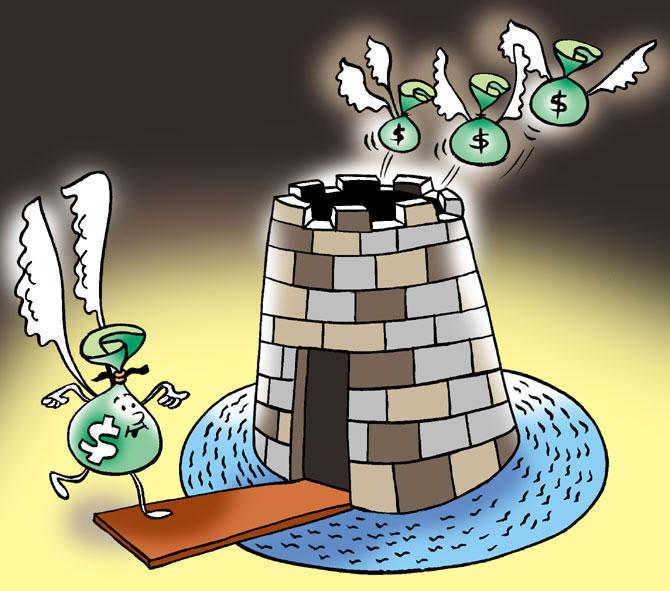Experts say the rupee is expected to depreciate further during the year as there is huge maturity of forex loans coming up.
Dev Chatterjee & Viveat Susan Pinto report.

As the Indian currency hovers around its lowest versus the US greenback, several smaller and mid-sized companies are expected to face rough weather as almost 44 per cent of the foreign loans taken by Indian companies remained unhedged.
According to the data sourced from the Reserve Bank of India, Indian companies raised around $38.2 billion in the financial year ended in March.
Of this, only 56 per cent of the loans are hedged while the rest of the foreign loans remain unhedged, thus risking the companies to forex volatility.
Some of the unhedged loans may have natural cover in foreign exchange earnings.
Experts say the rupee is expected to depreciate further during the year as there is huge maturity of forex loans coming up.
Hence, Indian companies will have to either immediately take forward cover or book losses.
“While the exporting companies, including the software exporters, will have windfall gain due to falling rupee, the importing companies — if they have kept their unhedged positions — will face serious repercussions on their financials. But no large company — who has a proper risk management system, a strong board, and audit committee supervision — will allow them to keep their forex liability unhedged, particularly after the volatile geopolitical situation due to the Russia-Ukraine war,” said Prabal Banerjee, an international finance expert.
Most of the unhedged loans are taken by the smaller and mid-sized companies who want to reduce their costs, he said.
External commercial borrowings (ECBs), or foreign loans, have emerged an important source of financing for the Indian corporate sector.
Apart from relative cost advantage due to lower global interest rates for an extended period of time, it supplements the credit demand of the country and the growth.
As of now, ECBs account for a major share of India’s external debt at 36.8 per cent of the country’s external debt as of end of December last year, a report by Bank of Baroda said.
According to rating firm Moody’s, most of the rated companies have protections to limit the effect of currency fluctuations.
These include natural hedges in the form of revenue and costs denominated in or linked to the US dollar, some US dollar revenue and financial hedges, or a combination of these factors, which help limit the adverse effects on cash flow and leverage, even under a more severe deprecation scenario.
Nearly half the 23 India-based companies rated by Moody's have natural hedges that mitigate their exposure to rupee weakness, it said.
Corporate leaders said a weak rupee increases the landed cost of imported goods, which also gives domestic manufacturers of such goods the leeway to raise prices.
While global prices of oil and metals have been cooling off of late on account of recession fears, these gains will be offset against currency volatility as interest costs will increase.
“The central bank has had to go in for a couple of rounds of repo rate hikes to rein in inflation. This has increased the interest cost for companies.
"At the same time, companies, such as ours, have receivables and payments in dollars.
"This is because 50 per cent of our business comes from overseas markets.
"While we do buy inputs in dollars, our collections are also in multiple currencies, including the dollar.
"We have a large portion of our outward and inward exposures hedged to protect us from currency volatility,” said Vimal Kejriwal, managing director and chief executive officer of KEC International.
In a recent press conference, SN Subrahmanyan, managing director & chief executive officer of L&T, indicated how the company was mitigating currency and commodity risks.
“Many of our contracts have a price variation clause.
"Some of them don’t, resulting in some impact on margins when commodity prices increase.
"Overall, we have to strike a balance, ensure all contracts have a price variation (PV) clause, and renegotiate when the price increases are more than the contract clause and hedge for commodity risk,” he said.
The engineering major isn’t the only company to be contemplating these strategies to mitigate commodity and currency risks.
Companies across the infrastructure, capital goods, and cement sectors are having to put in place outward and inward covers to protect margins from currency volatility.
Smaller players, say analysts, face significant challenges during times of cost inflation, which also pushes up their working capital requirements.











